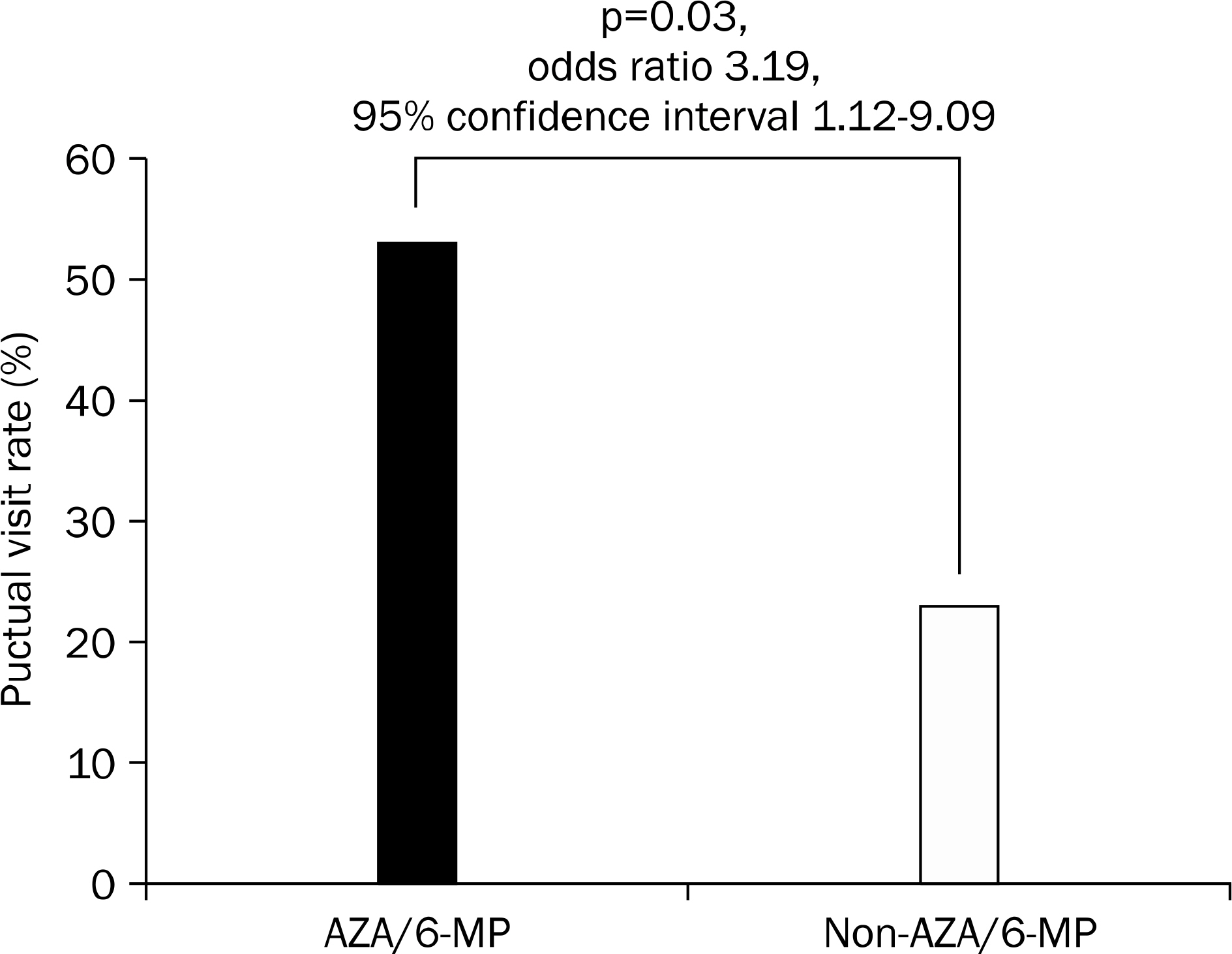Korean J Gastroenterol.
2013 Jun;61(6):313-318. 10.4166/kjg.2013.61.6.313.
The Association between the Therapeutic Agent and the Compliance of the Patients with Inflammatory Bowel Diseases
- Affiliations
-
- 1Department of Internal Medicine, Dongguk University Ilsan Hospital, the Graduate School, Dongguk University, Goyang, Korea. kimjaehak@dumc.or.kr
- KMID: 1718062
- DOI: http://doi.org/10.4166/kjg.2013.61.6.313
Abstract
- BACKGROUND/AIMS
Adherence of the patients with inflammatory bowel diseases is important to maintain the remission. However, the patients do not always keep their appointments for treatment. The aim of this study was to investigate the clinical factors associated with adherence of patients in terms of appointment keeping.
METHODS
A total of 73 subjects were retrospectively investigated from September 2005 to January 2012 at Dongguk University Ilsan Hospital (Goyang, Korea). We reviewed medical records including the age, sex, residence, medications, the disease activity, and the rate of keeping the date. A punctual visit was defined as outpatient visit on the scheduled date +/-7 days. Punctual patients for the visit were defined as their punctual visit rates exceed 90%.
RESULTS
Male to female ratio was 2.4:1. Mean age was 41.5+/-15.4 years (range, 20 to 78 years). Ulcerative colitis was 53 cases (72.6%) and Crohn's disease was 20 cases (27.4%). Mean duration of disease was 42.0+/-41.6 months (range, 4 to 226 months). Mean puntual visit rate was 86.7+/-16.0% (range, 27 to 100). Thirty-eight patients (52.1%) were punctual patients for the visit. Azathioprine/6-mercaptopurine treatment was associated with punctual patients for the visit (odd ratio, 3.19; 95% confidence interval, 1.12 to 9.09; p=0.03). However, other clinical factors did not influence the punctual visit rates.
CONCLUSIONS
Our study demonstrated that the use of azathioprine/6-mercaptopurine was associated with keeping the appointment for meeting the doctor. Further prospective study would be necessary.
MeSH Terms
-
6-Mercaptopurine/therapeutic use
Adult
Age Factors
Aged
Anti-Bacterial Agents/*therapeutic use
Anti-Inflammatory Agents, Non-Steroidal/*therapeutic use
Antibodies, Monoclonal/therapeutic use
Azathioprine/therapeutic use
Demography
Female
Humans
Immunosuppressive Agents/*therapeutic use
Inflammatory Bowel Diseases/*drug therapy
Male
Middle Aged
*Patient Compliance
Retrospective Studies
Severity of Illness Index
Sex Factors
6-Mercaptopurine
Anti-Bacterial Agents
Anti-Inflammatory Agents, Non-Steroidal
Antibodies, Monoclonal
Azathioprine
Immunosuppressive Agents
Figure
Reference
-
References
1. Loftus EV Jr. Clinical epidemiology of inflammatory bowel disease: Incidence, prevalence, and environmental influences. Gastroenterology. 2004; 126:1504–1517.
Article2. Yang SK, Loftus EV Jr, Sandborn WJ. Epidemiology of inflammatory bowel disease in Asia. Inflamm Bowel Dis. 2001; 7:260–270.
Article3. Nagahori M, Nemoto Y, Watanabe M. Pathogenesis of inflammatory bowel diseases. Intest Res. 2010; 8:9–17.
Article4. Reif S, Klein I, Lubin F, Farbstein M, Hallak A, Gilat T. Pre-illness dietary factors in inflammatory bowel disease. Gut. 1997; 40:754–760.
Article5. MacDermott RP. Alterations of the mucosal immune system in inflammatory bowel disease. J Gastroenterol. 1996; 31:907–916.
Article6. Yang SK, Yun S, Kim JH, et al. Epidemiology of inflammatory bowel disease in the Songpa-Kangdong district, Seoul, Korea, 1986–2005: a KASID study. Inflamm Bowel Dis. 2008; 14:542–549.
Article7. Schroeder K, Fahey T, Ebrahim S. How can we improve adherence to blood pressure-lowering medication in ambulatory care? Systematic review of randomized controlled trials. Arch Intern Med. 2004; 164:722–732.8. Pasternak RC. Report of the Adult Treatment Panel III: the 2001 National Cholesterol Education Program guidelines on the detection, evaluation and treatment of elevated cholesterol in adults. Cardiol Clin. 2003; 21:393–398.
Article9. Levy RL, Feld AD. Increasing patient adherence to gastroenterology treatment and prevention regimens. Am J Gastroenterol. 1999; 94:1733–1742.
Article10. Haynes RB. Determinants of compliance: The disease and the mechanism of treatment. Haynes RB, Taylor DW, Sackett DL, editors. Compliance in health care. Baltimore: Johns Hopkins University Press;1979.11. DiMatteo MR. Adherence to treatment. Feldman MD, Christensen JF, editors. Behavioral medicine in primary care: a practical guide. New York: Appleton & Lange;1997. p. 136–140.12. Kane S, Huo D, Aikens J, Hanauer S. Medication nonadherence and the outcomes of patients with quiescent ulcerative colitis. Am J Med. 2003; 114:39–43.
Article13. Eaden J, Abrams K, Ekbom A, Jackson E, Mayberry J. Colorectal cancer prevention in ulcerative colitis: a case-control study. Aliment Pharmacol Ther. 2000; 14:145–153.
Article14. Hanauer SB, Baert FJ. The management of ulcerative colitis. Annu Rev Med. 1995; 46:497–505.15. Steinhart H. Maintenance therapy in Crohn's disease. Can J Gastroenterol. 2000; 14(Suppl C):23C–28C.
Article16. Kane SV. Systematic review: adherence issues in the treatment of ulcerative colitis. Aliment Pharmacol Ther. 2006; 23:577–585.
Article17. Robinson A. Review article: improving adherence to medication in patients with inflammatory bowel disease. Aliment Pharmacol Ther. 2008; 27(Suppl 1):9–14.
Article18. Sewitch MJ, Abrahamowicz M, Barkun A, et al. Patient non-adherence to medication in inflammatory bowel disease. Am J Gastroenterol. 2003; 98:1535–1544.
Article19. Kane SV, Cohen RD, Aikens JE, Hanauer SB. Prevalence of non-adherence with maintenance mesalamine in quiescent ulcerative colitis. Am J Gastroenterol. 2001; 96:2929–2933.
Article20. Choi H, Kim SW, Lee KM, et al. Inter-physician variation in treatment for patients with Crohn's disease. Intest Res. 2009; 7:41–46.21. Esrailian E, Spiegel BM, Targownik LE, Dubinsky MC, Targan SR, Gralnek IM. Differences in the management of Crohn's disease among experts and community providers, based on a national survey of sample case vignettes. Aliment Pharmacol Ther. 2007; 26:1005–1018.
Article
- Full Text Links
- Actions
-
Cited
- CITED
-
- Close
- Share
- Similar articles
-
- Chemoprevention of Colorectal Cancer in Inflammatory Bowel Disease
- Safe and appropriate use of laxatives for colonoscopy
- Treatment of inflammatory bowel diseases: focusing on biologic agents and new therapies
- Natural Product-Derived Drugs for the Treatment of Inflammatory Bowel Diseases
- Inflammatory Bowel Disease and Lymphoproliferative Disorders


